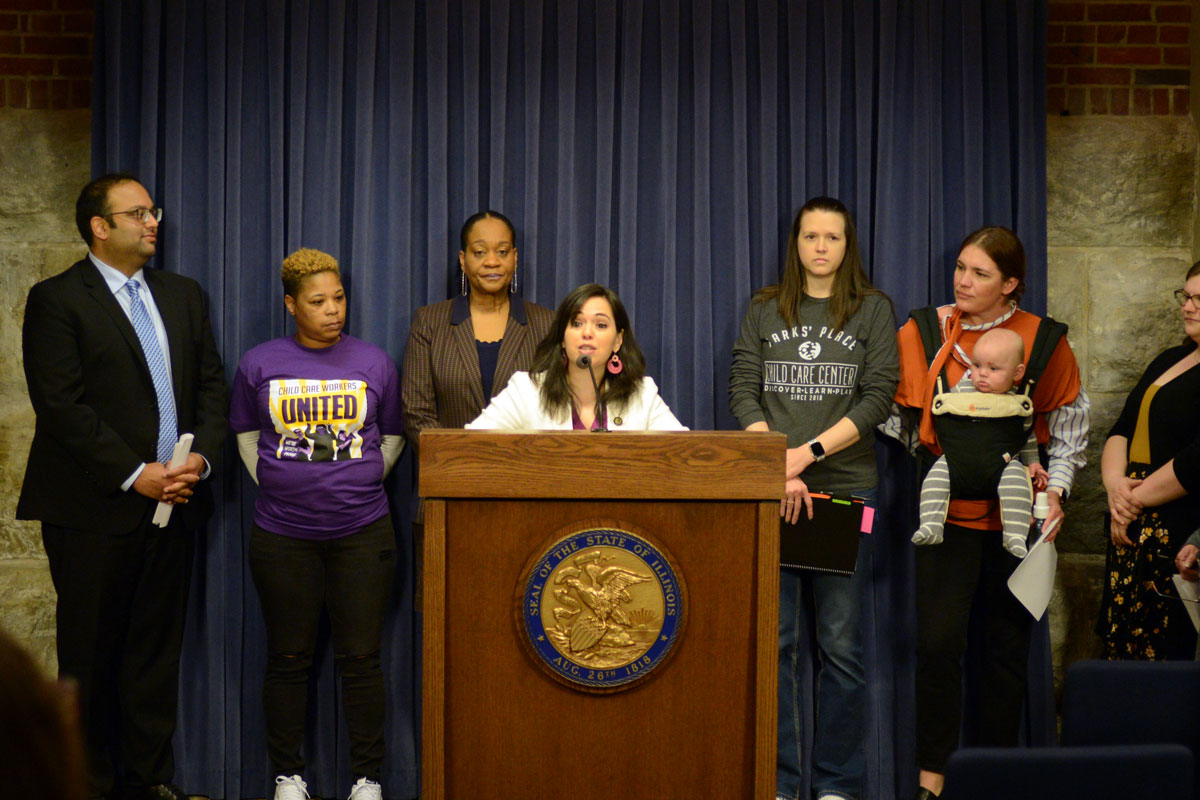 The multi-bill plan prioritizes employee wages, co-payers, eligibility and awareness
The multi-bill plan prioritizes employee wages, co-payers, eligibility and awareness
SPRINGFIELD – One in three families across the nation struggle to connect with affordable and accessible child care – an all-too-common issue millions of Illinoisans face. Members of the Illinois Senate Democratic Caucus outlined their child care agenda to combat low worker wages and expand eligibility at a press conference Wednesday.
“Working families deserve access to quality, affordable child care to ensure their children are in a safe, learning environment,” said State Senator Ram Villivalam (D-Chicago). “We also must ensure that our child care providers have a livable wage, the best working conditions, and great benefits. They deserve nothing less and they certainly should not be working in poverty.”
Part of the child care accessibility issue lies within an ongoing worker vacancies. According to a 2022 report by the Illinois Child Care for All Coalition, there are not enough child care spots available for half of Illinois children under six – in part because there are not enough workers. One in five child care workers live in poverty, making hourly minimum wage.
To combat the worker vacancies, Villivalam is pushing to increase wages for state-funded early childhood program workers to no lower than $25 per hour by Fiscal Year 2027. Senate Bill 2053 would create an Early Childhood Workforce Standards Board to determine wage floors for workers.
“This bill will also give my coworkers and I a voice on the job, so that if schedules change or policies shift we can work with our employers to figure things out,” said Kaya Jackson, an early childhood educator. “If we want to keep early educators in this field, we the educators need to have a voice in the decisions that impact us. And by investing in training and accountability, we can build the child care workforce we need. We can’t afford to wait – we need to pass this bill and invest in child care.”
Yet the problem doesn’t stop there. Child care has become increasingly expensive for families – especially those who live below the federal poverty line. Oftentimes, parents have to choose if it’s even worth it for them to work because they’re paying more than their salary in care.
Currently, Child Care Assistance Program families who make 100% of the Federal Poverty Level or below are eligible for $1 co-payment. That equates to a family of three making less than $24,860, a family of four below $30,000 and a family of five below $35,140.
Under Senate Bill 2402, that would be raised to 140% by July 1, 2023 and then to 185% by July 1, 2024.
“Without affordable child care, families may have to make difficult decisions like reducing their hours at work to care for their children, bringing home less income that would be able to put food on the table or pay for essential utilities,” said Pacione-Zayas (D-Chicago). “Families need accessible, affordable child care to support their loved ones, and I am excited that our proposed legislation will work to make this a reality.”
While a number of programs exist to help families with the burdensome cost of child care, many are unaware of their opportunities or don’t quite qualify for assistance.
To expand eligibility and awareness, Pacione-Zayas is leading the charge through Senate Bill 1796 to make all families or households receiving benefits under SNAP or medical assistance benefits eligible for the Child Care Assistance Program. Additionally, the measure would increase overall economic eligibility with a gradual increase from 250-400% Federal Poverty Level in 25% annual increments starting in Fiscal Year 2025.
Additionally, Villivalam and Pacione-Zayas are advocating for the Fiscal Year 2024 budget to include $10 million to the Department of Human Services to be used to promote the availability of the Child Care Assistance Program to families with children under the age of 13 and to child care providers.
The proposals await further consideration before the Senate.













 © 2026 Illinois Senate Democratic Caucus
© 2026 Illinois Senate Democratic Caucus